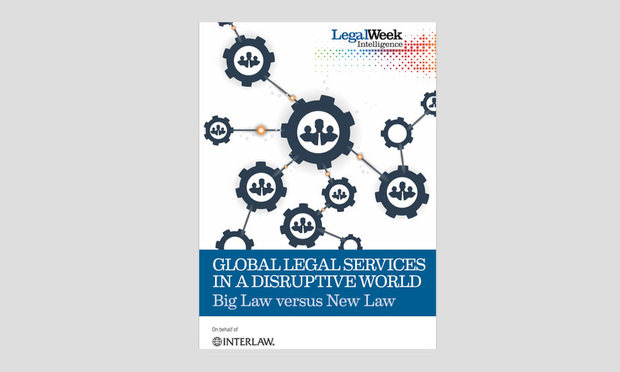Global Law Firm Network Report Suggests Tougher Competition for Big Law
The report said the results “reaffirm the widely held belief that today's GCs are continuing their quest to find a panacea for the provision of their global legal services–a provider that combines high quality service, a global footprint, local insight and cultural awareness."
March 13, 2018 at 05:13 PM
4 minute read
 Photo credit: ALM
Photo credit: ALM Big global law firms are increasingly feeling the competition from independent or boutique law firm networks, as nearly half of the in-house counsel in a recent survey said they use or intend to use such a network.
The report, “Global Legal Services in a Disruptive World,” was published by ALM/Legal Week in partnership with Interlaw, itself a global law firm network. It was published this February after surveying more than 100 general counsel and senior in-house lawyers across 41 countries. The British publication Legal Week is part of ALM, which also publishes Corporate Counsel.
The report said the results “reaffirm the widely held belief that today's GCs are continuing their quest to find a panacea for the provision of their global legal services—a provider that combines high quality service, a global footprint, local insight and cultural awareness.”
Some 77 percent of the in-house lawyers surveyed described their experience of using law firm networks as “excellent” or “good.” And 87 percent said they either “strongly agreed” or “agreed” with the statement “I'm increasingly more focused on ensuring I receive a quality service in each jurisdiction in which my organization operates, than [on] the structure of my legal services provider.”
While respondents used words such as “convenient,” “professional” and “reliable” to describe the networks, not everyone was so positive. Some said they found the networks “complicated,” “confusing,” “impractical” and “inflexible.”
As some major law firms have been retreating from international jurisdictions, the research found that 83 percent of international firms' lawyers are based in the U.K., Europe or North America. The report said this raises “legitimate questions about whether such firms do indeed have a truly global presence.”
The report quoted one general counsel, Tom Flynn, of the U.S. tech company Tangoe Inc. in Parsippany, New Jersey, as saying he typically receives a better, more responsive experience when using global referral networks.
“On one occasion when I ventured out and used a large international law firm for advice on data privacy, I had the worst experience I have had since using outside counsel,” Flynn was quoted as saying in the report. “They basically gave me a collection of comments on things from all of their local offices. There was no practical advice. I had a junior person, and it cost me a fortune.”
Other general counsel talked about some Big Law firms not always having a lawyer with the needed expertise in the right location.
Vincent Cordo Jr., global sourcing officer for the legal department at the Shell Oil Co. in Houston, said networks have been “extremely useful when we need to source local counsel in areas where we might not have that thumbprint available.”
Along similar lines, Jordan Kanfer, executive vice president and general counsel of NTT America Inc. in New York, told Corporate Counsel in a recent interview that he often prefers boutique law firms when looking globally.
“A boutique firm that is highly specialized, local to a particular jurisdiction or has significant experience with a particular issue is generally a better fit than a big firm that may, or may not, have someone with the right expertise,” Kanfer said. “And it's always going to be more cost-effective.”
The ALM report concluded: “In the end, the geographic arms race to create a global platform that offers clients rapid access to top quality and seamless legal advice, regardless of where in the world they are headquartered or operate, rages on.”
This content has been archived. It is available through our partners, LexisNexis® and Bloomberg Law.
To view this content, please continue to their sites.
Not a Lexis Subscriber?
Subscribe Now
Not a Bloomberg Law Subscriber?
Subscribe Now
NOT FOR REPRINT
© 2025 ALM Global, LLC, All Rights Reserved. Request academic re-use from www.copyright.com. All other uses, submit a request to [email protected]. For more information visit Asset & Logo Licensing.
You Might Like
View All
Trump Taps McKinsey CLO Pierre Gentin for Commerce Department GC

Upstart Insurer That's Wowing Industry Hires AIG Legal Exec to Help Guide Global Expansion
2 minute read
GOP-Led SEC Tightens Control Over Enforcement Investigations, Lawyers Say

Trending Stories
- 1Recent Controversial Decision and Insurance Law May Mitigate Exposure for Companies Subject to False Claims Act Lawsuits
- 2Visa Revocation and Removal: Can the New Administration Remove Foreign Nationals for Past Advocacy?
- 3Your Communications Are Not Secure! What Legal Professionals Need to Know
- 4Legal Leaders Need To Create A High-Trust Culture
- 5There's a New Chief Judge in Town: Meet the Top Miami Jurist
Who Got The Work
J. Brugh Lower of Gibbons has entered an appearance for industrial equipment supplier Devco Corporation in a pending trademark infringement lawsuit. The suit, accusing the defendant of selling knock-off Graco products, was filed Dec. 18 in New Jersey District Court by Rivkin Radler on behalf of Graco Inc. and Graco Minnesota. The case, assigned to U.S. District Judge Zahid N. Quraishi, is 3:24-cv-11294, Graco Inc. et al v. Devco Corporation.
Who Got The Work
Rebecca Maller-Stein and Kent A. Yalowitz of Arnold & Porter Kaye Scholer have entered their appearances for Hanaco Venture Capital and its executives, Lior Prosor and David Frankel, in a pending securities lawsuit. The action, filed on Dec. 24 in New York Southern District Court by Zell, Aron & Co. on behalf of Goldeneye Advisors, accuses the defendants of negligently and fraudulently managing the plaintiff's $1 million investment. The case, assigned to U.S. District Judge Vernon S. Broderick, is 1:24-cv-09918, Goldeneye Advisors, LLC v. Hanaco Venture Capital, Ltd. et al.
Who Got The Work
Attorneys from A&O Shearman has stepped in as defense counsel for Toronto-Dominion Bank and other defendants in a pending securities class action. The suit, filed Dec. 11 in New York Southern District Court by Bleichmar Fonti & Auld, accuses the defendants of concealing the bank's 'pervasive' deficiencies in regards to its compliance with the Bank Secrecy Act and the quality of its anti-money laundering controls. The case, assigned to U.S. District Judge Arun Subramanian, is 1:24-cv-09445, Gonzalez v. The Toronto-Dominion Bank et al.
Who Got The Work
Crown Castle International, a Pennsylvania company providing shared communications infrastructure, has turned to Luke D. Wolf of Gordon Rees Scully Mansukhani to fend off a pending breach-of-contract lawsuit. The court action, filed Nov. 25 in Michigan Eastern District Court by Hooper Hathaway PC on behalf of The Town Residences LLC, accuses Crown Castle of failing to transfer approximately $30,000 in utility payments from T-Mobile in breach of a roof-top lease and assignment agreement. The case, assigned to U.S. District Judge Susan K. Declercq, is 2:24-cv-13131, The Town Residences LLC v. T-Mobile US, Inc. et al.
Who Got The Work
Wilfred P. Coronato and Daniel M. Schwartz of McCarter & English have stepped in as defense counsel to Electrolux Home Products Inc. in a pending product liability lawsuit. The court action, filed Nov. 26 in New York Eastern District Court by Poulos Lopiccolo PC and Nagel Rice LLP on behalf of David Stern, alleges that the defendant's refrigerators’ drawers and shelving repeatedly break and fall apart within months after purchase. The case, assigned to U.S. District Judge Joan M. Azrack, is 2:24-cv-08204, Stern v. Electrolux Home Products, Inc.
Featured Firms
Law Offices of Gary Martin Hays & Associates, P.C.
(470) 294-1674
Law Offices of Mark E. Salomone
(857) 444-6468
Smith & Hassler
(713) 739-1250






